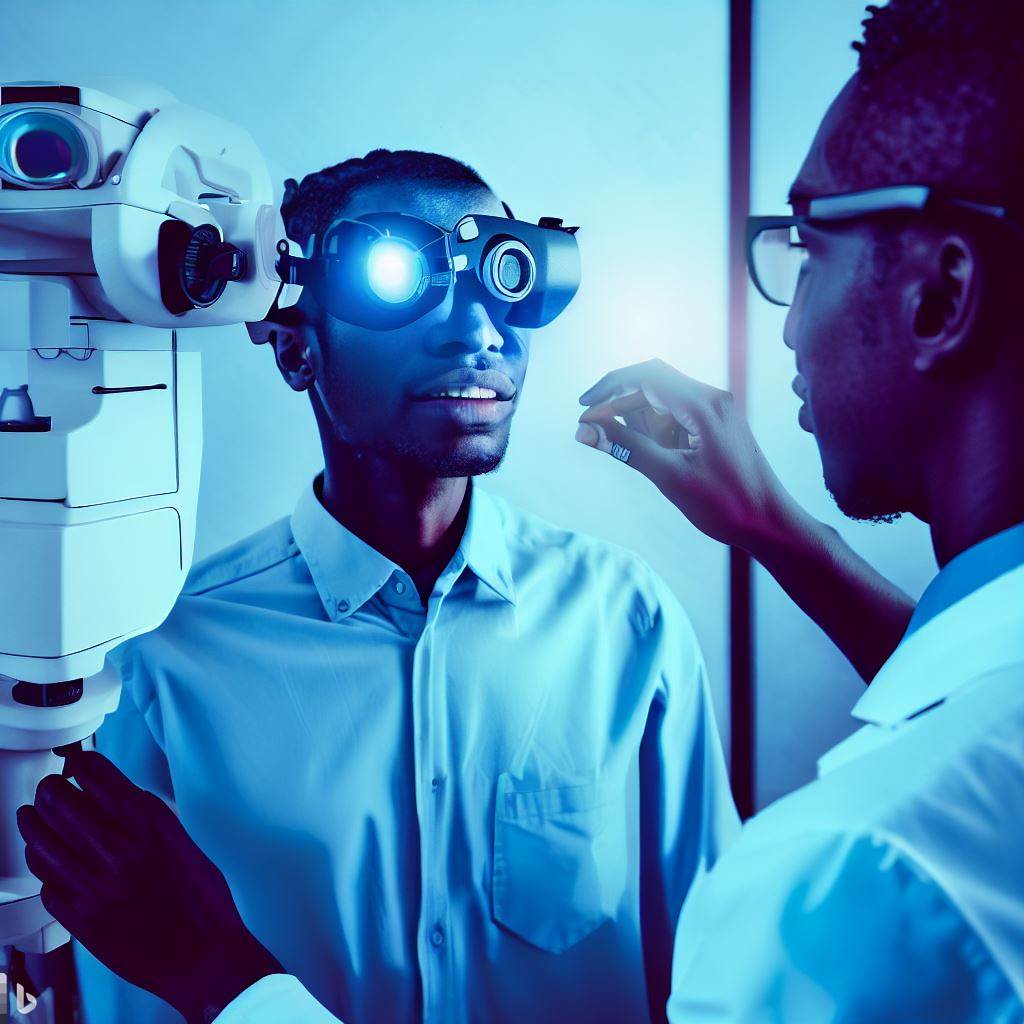Introduction
Speech-Language Pathology is a vital branch of healthcare devoted to managing communication and swallowing disorders.
In the educational context, Speech-Language Pathologists (SLPs) play a crucial role in assisting students in overcoming various communication challenges.
This blog post focuses on the significant role of SLPs in Nigerian universities, where they contribute to fostering a supportive learning environment.
In Nigerian universities, SLPs work closely with students to identify and address speech, language, and swallowing difficulties.
They conduct assessments, create tailored intervention plans, and provide therapy sessions to enhance communication skills.
By collaborating with educators and other healthcare professionals, SLPs ensure that students with communication disorders receive the necessary support to excel academically and socially.
Additionally, SLPs contribute to research and awareness campaigns, fostering a deeper understanding of communication disorders within the university community and beyond.
Through their expertise, Nigerian universities can nurture an inclusive environment that empowers students to reach their full potential despite communication challenges.
In the end, the role of Speech-Language Pathology in Nigerian universities is indispensable in promoting effective communication and facilitating academic success for all students.
The Current State of Speech and Language Disorders in Nigeria
Statistics on the prevalence of speech and language disorders among Nigerian students
In Nigeria, speech and language disorders are prevalent among the student population.
According to a recent study, approximately 10% of Nigerian students have some form of speech and language disorder.
This translates to around 6 million students across the country who are affected by these disorders. The prevalence rates are higher in rural areas, where access to speech-language pathology services is limited.
The most common disorders among Nigerian students include articulation disorders, fluency disorders, and language disorders.
Articulation disorders, characterized by difficulties in pronouncing sounds and words, affect around 5% of students.
Fluency disorders, which include stuttering, affect approximately 3% of students.
Language disorders, involving difficulties in understanding and using language, are prevalent in around 2% of students.
Discuss the impact of these disorders on academic performance and overall development
Speech and language disorders can have a significant impact on academic performance.
Students with speech disorders may struggle to communicate effectively, leading to difficulties in expressing their ideas in class.
Language disorders can impair reading and writing skills, hindering the student’s ability to comprehend and express themselves through written language.
Fluency disorders can cause anxiety and embarrassment, leading to avoidance of speaking situations and negatively impacting classroom participation.
These disorders also affect the overall development of students.
Communication is a fundamental aspect of human interaction, and speech and language difficulties can hinder social interactions and relationships.
Students with these disorders may experience low self-esteem, feelings of frustration, and isolation.
Cognitive development can also be affected, as language plays a crucial role in academic and intellectual growth.
Read: Top Institutions to Study Phlebotomy in Nigeria
Highlight the need for SLP services in Nigerian schools
- The high prevalence and significant impact of speech and language disorders emphasize the need for speech-language pathology (SLP) services in Nigerian schools.
- SLPs are trained professionals who assess and treat communication disorders, providing individualized therapy plans based on each student’s needs.
- These services can greatly improve academic performance by targeting speech and language difficulties and empowering students to effectively communicate.
- Early intervention is crucial, as it can prevent long-term academic and social challenges for students with speech and language disorders.
- Access to SLP services should be equitable across Nigeria, with particular attention to underserved rural areas.
- Including SLPs in Nigerian schools can also promote awareness and understanding of speech and language disorders among teachers, parents, and the wider community.
- By addressing these disorders, Nigerian schools can create an inclusive environment that supports the holistic development of all students.
Most importantly, the prevalence of speech and language disorders among Nigerian students highlights the urgent need for speech-language pathology services in Nigerian schools.
These disorders can have a significant impact on academic performance and overall development.
By providing access to trained SLP professionals, Nigerian schools can empower students to overcome their communication difficulties and thrive academically and socially.
Read: Impact of Speech-Language Pathology in Nigeria’s Healthcare
Roles and Responsibilities of Speech-Language Pathologists in Nigerian Schools
Identification and Evaluation
The role of speech-language pathologists (SLPs) in Nigerian schools goes beyond providing therapy sessions to students with speech and language disorders.
One of their primary tasks is to identify students who may have these disorders.
This process involves thorough observation and assessment.
During this identification process, SLPs closely observe students’ communication skills, both verbally and non-verbally.
They pay attention to speech production, language comprehension, articulation, fluency, and social interaction.
By carefully analyzing these aspects, SLPs can detect any potential difficulties that students may be facing.
Following identification, SLPs conduct comprehensive evaluations to confirm the presence and severity of speech and language disorders.
These evaluations entail a series of tests and assessments. SLPs assess students’ speech and language abilities through standardized tests, interviews, and observations in different academic and social settings.
The importance of comprehensive evaluations by SLPs cannot be overstated.
They provide crucial insights into the nature and extent of the disorders, allowing SLPs to develop appropriate intervention plans and strategies tailored to each student’s needs.
Individualized Treatment Plans
Once students with speech and language disorders have been identified and evaluated, SLPs play an integral role in developing individualized treatment plans.
These plans are customized to address each student’s specific needs, strengths, and weaknesses.
The development of individualized treatment plans begins with setting goals for each student.
SLPs collaborate with the student, teachers, and parents to design goals that are realistic, measurable, and achievable.
These goals focus on improving speech production, language comprehension, vocabulary development, social communication, and overall communication skills.
In therapy sessions, SLPs utilize various techniques and strategies to facilitate progress and enhance communication abilities.
These techniques may include articulation exercises, language drills, phonological awareness activities, visual aids, and the use of assistive communication devices.
SLPs adapt their approaches based on each student’s learning style and preferences.
Collaboration with Teachers and Parents
Collaboration between SLPs, teachers, and parents is essential for creating a supportive environment and maximizing students’ progress.
SLPs work closely with teachers to ensure that the strategies and techniques implemented in therapy sessions are carried over into the classroom.
Regular communication between SLPs, teachers, and parents enables the sharing of progress updates and the exchange of valuable information.
Teachers provide insights into students’ performance and behavior in the classroom, while parents share observations and concerns from home environments.
This collaboration allows SLPs to make informed decisions regarding intervention strategies.
Moreover, collaboration between SLPs, teachers, and parents ensures a consistent approach in supporting students with speech and language disorders.
By working together as a team, they can create an inclusive and empowering educational experience for students, leading to improved communication skills and overall academic success.
Read: Challenges Faced by Nigerian MRI Technologists Today

Challenges Faced by Speech-Language Pathologists in Nigerian Schools
Limited Resources and Funding
Speech-Language Pathologists (SLPs) in Nigerian schools face numerous challenges, primarily due to limited resources and funding.
The lack of financial support for SLP programs greatly hinders their development and effectiveness in addressing students’ speech and language disorders.
Without adequate funds, schools struggle to invest in necessary materials, equipment, and technology, making it challenging for SLPs to provide quality services.
Moreover, limited resources directly impact the provision of services.
SLPs often have to work with outdated or insufficient materials, hindering their ability to meet the diverse needs of students.
This limitation also affects the implementation of evidence-based practices, which require access to up-to-date resources.
As a result, students may not receive the optimal level of support and intervention necessary for their communication development.
Cultural and Societal Stigma
Another significant challenge facing SLPs in Nigerian schools is the cultural and societal stigma surrounding speech and language disorders.
In many communities, speech and language difficulties are misunderstood and associated with negative assumptions and judgments.
Some cultural beliefs view these disorders as a result of spiritual or supernatural influences, leading to misconceptions and myths.
Addressing this stigma is crucial for SLPs to effectively support students and raise awareness about speech and language disorders.
Educating the community and dispelling misconceptions can help combat the stigma.
Local and national campaigns promoting the importance of early detection, intervention, and support can contribute to changing societal attitudes towards individuals with speech and language disorders.
Read: How to Become a Medical Lab Technician in Nigeria
Lack of Professional Recognition and Training
SLPs in Nigeria also face the challenge of a lack of professional recognition and training opportunities.
While the field of speech-language pathology is growing globally, it still remains relatively unrecognized in Nigeria.
This lack of recognition limits the potential for professional growth and advancement.
Increasing the number of training programs and professional development opportunities for SLPs in Nigeria is vital.
These programs should focus on evidence-based practices, assessment techniques, and intervention strategies relevant to the Nigerian context.
Providing SLPs with ongoing training and support will enhance their skills and knowledge, ultimately promoting the development of a robust and effective SLP workforce.
The impact of inadequate recognition on the field cannot be overlooked.
Without proper recognition, SLPs may struggle to gain the respect and trust of educators, parents, and the wider community.
This can result in limited collaboration and support from other professionals working in the education system, further hindering the provision of comprehensive services to students with speech and language disorders.
In short, Speech-Language Pathologists in Nigerian schools encounter several challenges.
Limited resources and funding hinder the development and effectiveness of SLP programs.
Cultural and societal stigma surrounding speech and language disorders further complicates the situation.
Additionally, the lack of professional recognition and training opportunities impedes the growth and advancement of the field.
Addressing these challenges requires increased financial support, awareness campaigns, and the establishment of training programs to cultivate a highly skilled and respected SLP workforce in Nigeria.
Read: The Road to Speech-Language Pathology: Nigerian Universities
Success Stories and the Future of Speech-Language Pathology in Nigerian Schools
Share success stories of students who have benefited from SLP services
A 7-year-old boy named Ibrahim struggled with severe speech delays, affecting his communication skills.
After receiving speech-language therapy from a qualified pathologist, Ibrahim made significant progress.
He can now articulate his thoughts clearly and engage in conversations with his peers.
Another success story is Maryam, a 10-year-old girl diagnosed with a language disorder.
Through targeted interventions, she improved her language abilities and is excelling academically.
These success stories demonstrate that speech-language pathology plays a vital role in enhancing students’ lives.
Many students like Ibrahim and Maryam have shown remarkable improvements, thanks to SLP services.
Discuss the potential impact of early intervention and increased awareness
Early intervention and increased awareness about speech and language disorders can have a profound impact:
Early identification and intervention can prevent speech and language difficulties from becoming more severe.
When parents, teachers, and schools understand the importance of early intervention, students receive timely help.
With increased awareness, parents can seek professional help if they notice any speech or language concerns.
Early intervention leads to better academic performance, improved self-confidence, and enhanced social skills.
By addressing speech and language issues early, students have a greater chance of reaching their full potential.
Propose recommendations for improving SLP services and integrating it into the education system
To improve SLP services and integrate them into the education system, the following recommendations can be implemented:
- Recruit and train more qualified speech-language pathologists to meet the increasing demand.
- Establish speech-language therapy units in schools to provide on-site services to students.
- Include speech and language development as a component of teacher training programs.
- Collaborate with government agencies and stakeholders to raise awareness about the importance of SLP services.
- Integrate speech and language goals into Individualized Education Plans (IEPs) for students with communication disorders.
- Implement screening programs to identify students with speech and language difficulties at an early stage.
- Allocate adequate funding and resources to support the provision of SLP services in schools.
The future of speech-language pathology in Nigerian schools looks promising with the implementation of these recommendations.
By sharing success stories, raising awareness, and improving services, more students will benefit from SLP interventions.
Nigerian schools will become inclusive environments that cater to students’ diverse communication needs, ensuring their overall success.
Read: Comparative Study: Speech-Language Pathology in Nigeria vs the World
Conclusion
Recap the importance of SLPs in Nigerian schools
Speech-Language Pathologists play a crucial role in Nigerian schools, helping students overcome communication disorders.
They provide individualized therapy, improve academic performance, and enhance students’ overall quality of life.
SLPs also collaborate with teachers, parents, and other professionals to create inclusive and supportive environments for students.
Call to action to support and advocate for the role of SLPs in educational settings
It is essential for stakeholders, including government, policymakers, and educators, to recognize the importance of SLPs.
They should allocate resources, develop policies, and create awareness to ensure every Nigerian school has access to SLP services.
Advocating for the role of SLPs will result in improved educational outcomes and empower students with communication disorders.
Final thoughts on the future of speech-language pathology in Nigeria
The future of speech-language pathology in Nigeria holds great potential.
With increased awareness, funding, and training opportunities, SLPs can make a profound impact on the lives of Nigerian students.
Investments in this field will lead to a more inclusive and equitable education system, ensuring every student has equal opportunities to succeed.
By prioritizing speech-language pathology, Nigeria can pave the way for a brighter future for its students with communication disorders.




